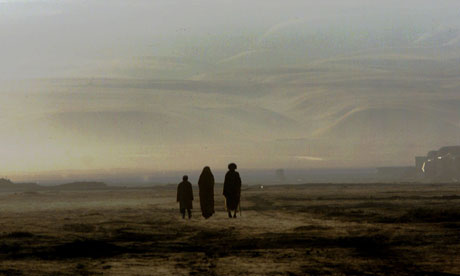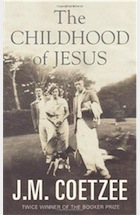Coetzee explores visions of a Buddhist utopia and a Kafkaesque retelling of the nativity story with compelling and puzzling results

Mystical path … Everybody has made the
same journey in The Childhood of Jesus. Photograph: Reuters
So here it is: the gospel according to JM Coetzee. A man and a boy arrive at
a resettlement centre, in an unnamed country where they know no one, looking for
employment and a place to live. The man is old and people assume, wrongly, that
the boy is his grandson. "Not my grandson, not my son," he explains to those who
ask. "But I am responsible for him." They have come from "the camp" in the
desert, where they learnt Spanish, the language of the country, and
were assigned new names. The boy has apparently become separated from his mother
on the boat over; they are "searching for family members". The officials are not
helpful. A room has been assigned to them in the centre, but the key for it
cannot be found. They are sent away for the night, and forced to sleep under an
iron sheet in a courtyard. Cold and tired, they return to the resettlement
centre in the morning, only to be told: "There are no rooms free.
 Since Coetzee won the Nobel prize in 2003, his books have mostly taken the
form of sly semi-autobiographical fragments. His last novel, Summertime
(2009), was a series of self-lacerating biographical sketches concerning the
South African novelist John Coetzee, "a little man, an unimportant little man",
who closely resembles the author in some respects but not others (being dead,
for example, unlike his real-life namesake). By contrast, The Childhood of
Jesus represents a return to the allegorical mode that made him famous. The
opening chapters bring to mind the internment camps and sinister bureaucracies
of his first Booker winner, Life & Times of Michael K (1983), the
story of a gardener in a counterfactual, civil war‑torn South Africa. The
invented, indeterminate location of the new novel also recalls Coetzee's first
international success, Waiting for the Barbarians (1980), which was set
on the edge of an imaginary empire, part British-controlled Africa and
part ancient Rome. But whereas both of those novels clearly – if
not straightforwardly – allegorised apartheid South Africa, The Childhood of
Jesus is much harder to decode.
Since Coetzee won the Nobel prize in 2003, his books have mostly taken the
form of sly semi-autobiographical fragments. His last novel, Summertime
(2009), was a series of self-lacerating biographical sketches concerning the
South African novelist John Coetzee, "a little man, an unimportant little man",
who closely resembles the author in some respects but not others (being dead,
for example, unlike his real-life namesake). By contrast, The Childhood of
Jesus represents a return to the allegorical mode that made him famous. The
opening chapters bring to mind the internment camps and sinister bureaucracies
of his first Booker winner, Life & Times of Michael K (1983), the
story of a gardener in a counterfactual, civil war‑torn South Africa. The
invented, indeterminate location of the new novel also recalls Coetzee's first
international success, Waiting for the Barbarians (1980), which was set
on the edge of an imaginary empire, part British-controlled Africa and
part ancient Rome. But whereas both of those novels clearly – if
not straightforwardly – allegorised apartheid South Africa, The Childhood of
Jesus is much harder to decode.
Initially, we seem to be reading a Kafkaesque version of the nativity story, with refugees playing the holy family in an uncaring host country. But it soon becomes clear that the city they have arrived in, Novilla, is far from uncaring. It is, in fact, a kind of utopia – a specifically Coetzeean version of utopia. (Asked about John Coetzee's political ideals, a character in Summertime suggests, only half-jokingly: "The closing down of the mines. The ploughing under of the vineyards. The disbanding of the armed forces. The abolition of the automobile. Universal vegetarianism. Poetry in the streets. That sort of thing.") The old man, now known as Simón, is quickly given a job at the docks, where "all his fellow stevedores strike him as good men: hard-working, friendly, helpful". They are kind to the boy, now named David. The city's workers attend philosophy classes every night; vegetarianism is mandatory (the alternative is eating rats); the horse and cart is still in action; and football matches, like music lessons, are free ("It's football," says a colleague when Simón tries to pay. "It's a game. You don't need to pay to watch a game.") When Simón points out that the sacks of grain they carry off the ships by hand could be unloaded by a crane in a tenth of the time, the foreman agrees. "But what would be the point?" he asks. "It is not as if there is an emergency, a food shortage for example."
Full review
Footnote:
Published by Text Publishing in ANZ - Hardback - 7 March - NZ$45 A$35.00
 Since Coetzee won the Nobel prize in 2003, his books have mostly taken the
form of sly semi-autobiographical fragments. His last novel, Summertime
(2009), was a series of self-lacerating biographical sketches concerning the
South African novelist John Coetzee, "a little man, an unimportant little man",
who closely resembles the author in some respects but not others (being dead,
for example, unlike his real-life namesake). By contrast, The Childhood of
Jesus represents a return to the allegorical mode that made him famous. The
opening chapters bring to mind the internment camps and sinister bureaucracies
of his first Booker winner, Life & Times of Michael K (1983), the
story of a gardener in a counterfactual, civil war‑torn South Africa. The
invented, indeterminate location of the new novel also recalls Coetzee's first
international success, Waiting for the Barbarians (1980), which was set
on the edge of an imaginary empire, part British-controlled Africa and
part ancient Rome. But whereas both of those novels clearly – if
not straightforwardly – allegorised apartheid South Africa, The Childhood of
Jesus is much harder to decode.
Since Coetzee won the Nobel prize in 2003, his books have mostly taken the
form of sly semi-autobiographical fragments. His last novel, Summertime
(2009), was a series of self-lacerating biographical sketches concerning the
South African novelist John Coetzee, "a little man, an unimportant little man",
who closely resembles the author in some respects but not others (being dead,
for example, unlike his real-life namesake). By contrast, The Childhood of
Jesus represents a return to the allegorical mode that made him famous. The
opening chapters bring to mind the internment camps and sinister bureaucracies
of his first Booker winner, Life & Times of Michael K (1983), the
story of a gardener in a counterfactual, civil war‑torn South Africa. The
invented, indeterminate location of the new novel also recalls Coetzee's first
international success, Waiting for the Barbarians (1980), which was set
on the edge of an imaginary empire, part British-controlled Africa and
part ancient Rome. But whereas both of those novels clearly – if
not straightforwardly – allegorised apartheid South Africa, The Childhood of
Jesus is much harder to decode.Initially, we seem to be reading a Kafkaesque version of the nativity story, with refugees playing the holy family in an uncaring host country. But it soon becomes clear that the city they have arrived in, Novilla, is far from uncaring. It is, in fact, a kind of utopia – a specifically Coetzeean version of utopia. (Asked about John Coetzee's political ideals, a character in Summertime suggests, only half-jokingly: "The closing down of the mines. The ploughing under of the vineyards. The disbanding of the armed forces. The abolition of the automobile. Universal vegetarianism. Poetry in the streets. That sort of thing.") The old man, now known as Simón, is quickly given a job at the docks, where "all his fellow stevedores strike him as good men: hard-working, friendly, helpful". They are kind to the boy, now named David. The city's workers attend philosophy classes every night; vegetarianism is mandatory (the alternative is eating rats); the horse and cart is still in action; and football matches, like music lessons, are free ("It's football," says a colleague when Simón tries to pay. "It's a game. You don't need to pay to watch a game.") When Simón points out that the sacks of grain they carry off the ships by hand could be unloaded by a crane in a tenth of the time, the foreman agrees. "But what would be the point?" he asks. "It is not as if there is an emergency, a food shortage for example."
Full review
Footnote:
Published by Text Publishing in ANZ - Hardback - 7 March - NZ$45 A$35.00
No comments:
Post a Comment